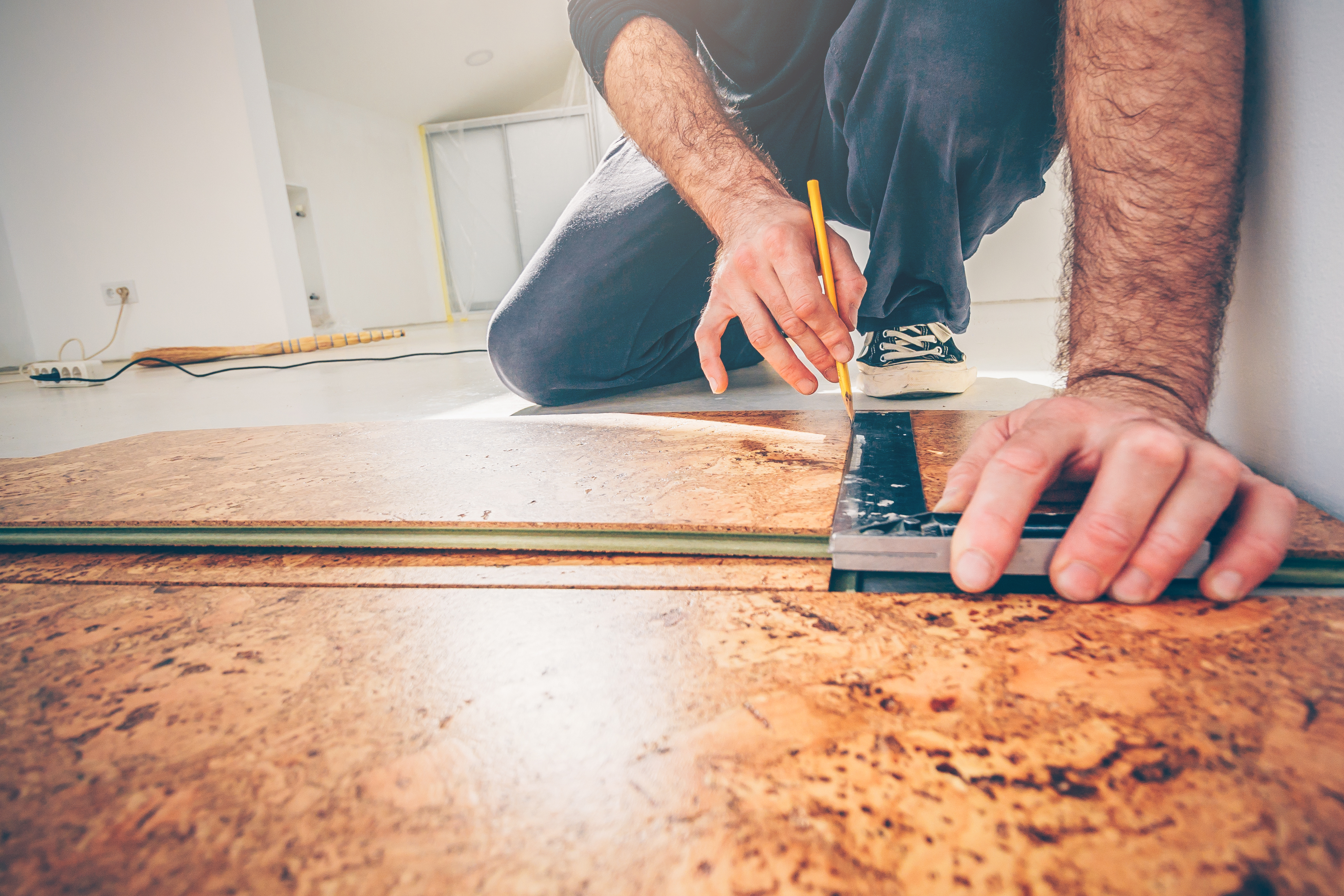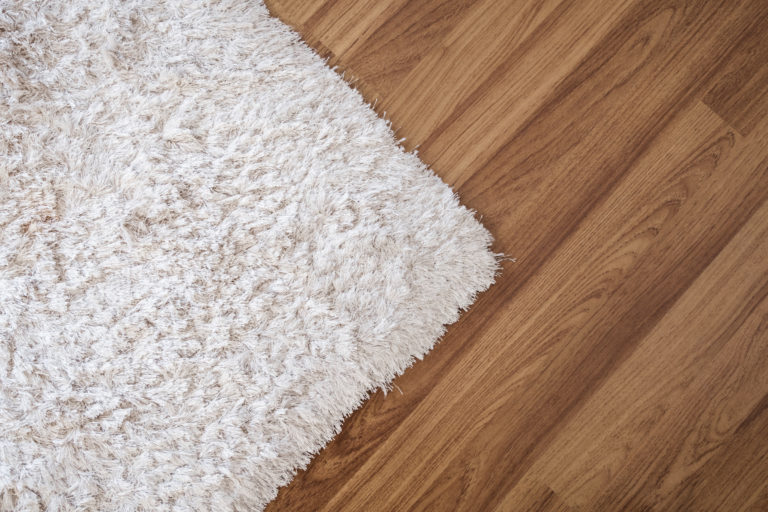This post may contain references or links to products from one or more partners of our parent company and/or subsidiaries of our parent company. For more information, visit this page.
February 18, 2020
Looking into the pros and cons of cork flooring? We get it. Cork flooring is rising in popularity, and for good reason—it’s environmentally friendly, it’s comfortable, and it comes in an almost endless variety of colors and patterns.
But the truth is, many people don’t even consider cork as a viable type of flooring—and we get that too. The cork in your wine bottle doesn’t necessarily seem like an ideal floor material; it seems squishy and fragile. Have you ever pulled out a dry cork and had it crumble into a sad mess? Why would you want your floor to do that?
In reality, though, cork can be an absolutely amazing and extremely durable flooring option. It’s packed with benefits, and can even come in finished versions that look like hardwood or even natural stone!
Basically, there are a lot of misconceptions about cork—so let’s clear them up with these pros and cons of cork flooring.
What is cork flooring?
Cork is a natural flooring option that comes from—you guessed it—cork trees! Unlike some other wood flooring types, though, cork trees do not have to be cut down to produce cork floors. Instead, the material is taken from the bark of the cork tree, leaving the tree to continue growing.
The cork bark is ground up, boiled, and then bound with adhesive resins. This material is then processed into sheets, planks, or tiles. Thanks to this finishing process, cork flooring can take any shape or size or color—making it ridiculously versatile when it comes to style. You can even buy engineered cork flooring; like engineered hardwood, this product is composed of an HDF or plywood base topped with a thin veneer of real cork.
Best Brands of 2024
The pros of cork flooring
Still not convinced? Grab a bottle of your favorite wine, pop the cork, and let’s talk about the pros of cork flooring.
Cork floors are flexible and soft
Cork flooring feels comfortable and soft underfoot, with just enough bounce to decrease strain on your joints. Plus, could potentially keep that dish you dropped from breaking (maybe). Seriously though; the Canadian Centre for Occupational Health and Safety recommends using cork as workplace flooring because it’s more comfortable for workers who have to stand for long periods of time.
Translation: if you have achy joints or just want a super-comfy floor, cork might be a great choice for you.
Cork flooring is environmentally friendly and sustainable
Cork is an environmentally friendly choice thanks to the sustainable way that it’s harvested. Remember: cork is only taken from a tree’s bark, while the rest of the cork tree is left to continue growing. Periodically harvesting cork bark ensures that the tree will remain healthy and strong for up to 250 years (seriously!).
Plus, the material used to make cork flooring is often “innovative repurpose”—a fancy way of saying “recycled waste material”. Basically, it’s the material that remains after wine bottle corks are punched out of the harvested bark. The leftovers are collected, bound together, and repurposed for flooring.
As the Green Home Guide puts it, cork has “some serious green cred”. Installing cork flooring in your home is a great opportunity to make a sensible, sustainable choice and get some “green cred” for yourself.
Cork is mold and mildew-resistant (and naturally antimicrobial!)
Cork is naturally anti-microbial and resistant to mold and mildew. A properly sealed cork floor is free of allergens from dust and mites (we’re looking at you, carpet) and unlike some floors that have been reported to emit chemicals such as formaldehyde, cork has very low to zero emissions. When it comes to the pros and cons of cork flooring, this one is firmly in the “pro” category.
Cork holds in heat
Cork has natural heat absorption properties, making it a perfect choice for children’s bedrooms, playrooms, or any other spaces in your home that could benefit from a warm floor. These heat absorption properties also help reduce heating costs during the colder winter months. In fact, cork floors have been found to have better insulation levels than most other types of flooring.
Installing cork flooring is easy
Cork flooring comes in a ton of different setups, so it’s easy to install no matter which choice you go with.
For example: you may already be familiar with peel and stick carpet tiles, but did you know that you can also purchase peel and stick cork tiles? These are super DIY-friendly, even for beginners. Just clean your subfloor, find your center line, and start sticking.
Cork can also be purchased as a modular floor in the form of click-together flooring planks. These planks lock together using special grooves rather than glue or nails, making them another great option for DIY-ers (lots of today’s best vinyl flooring options use click-lock systems for that exact reason).
Another option (you’ve got lots of them) is to buy a roll of cork flooring and lay it down in a single sheet. This option creates a beautifully seamless look, but buyer beware: If you’re anything like us, you’re going to want to hire a flooring professional to do it. Rolled cork needs to be cut and laid really carefully to avoid warping.

The cons of cork flooring
We promised that we’d tell you all about the pros and cons of cork flooring—and as with other types of flooring, cork does have a few drawbacks. Let’s talk about some of the disadvantages of cork floors.
Cork floors need to be sealed and maintained.
For some rooms in your home, waterproof flooring options are a must. Cork is not one of these options. While you can definitely give a degree of water resistance to your cork floor by sealing it with a polyurethane or wax product (or buying a pre-sealed floor), it will never be truly waterproof. And if water gets under the surface and into the cork… let’s just say you’re going to have a bad time.
Regardless of what room you put them in, cork floors always need to be well-sealed. Cork is a natural flooring material—and like all natural flooring materials, it needs to be maintained properly. You’ll need to reseal or refinish the floor periodically, though the frequency of this depends on the specific product you buy. Improperly sealed cork can get damaged very easily.
They can fade over time
Depending on the finish you choose, cork flooring has been known to fade in the sun. And while a faded floor might not sound that bad, don’t forget—it’s only going to fade in areas where the sun hits it. That means you might move your furniture and throw rugs after a few years and find their places marked forever. Ouch.
Darker cork floors or those with an artificial finish tend to have fewer problems with fading, but it’s still something to keep in mind when you’re considering the pros and cons of cork flooring.
Heavy use can damage cork floors
We can not stress this enough: you need to take precautions to protect your cork floors! The bounce they offer also comes with a tradeoff: heavy furniture can dent or gouge them.
You don’t have to go overboard, but you should use common sense. Have your kids check their Heelys at the door, and don’t let your spouse store their collection of antique anvils on it. Purchase some felt furniture pads and use care when moving heavy items (and be careful where you put the fridge).
They can also be expensive
At an average of $5–$7 per square foot, cork can be a bit more expensive than some other types of flooring. This price is dependent on the quality and finish of the cork you choose (and of course, whether you choose cork planks, roll, or tiles).
Is cork flooring right for you?
Cork flooring can be an excellent choice for tons of applications. It’s soft, springy, and has the perfect amount of give—making it great for children’s rooms or places where you may need to stand for long periods of time (like the kitchen). Plus, installation can be really simple depending on the type of product you choose.
Once properly sealed, a cork floor will be resistant to mold and mildew as well as pests like termites. It also doesn’t have the off-gassing issues that can appear with other types of natural flooring, and it’s an eco-friendly choice as well.
Of course, there are drawbacks: it needs to be regularly maintained (which is a non-starter for many buyers). It can fade over time, so it’s crucial to choose the correct product and think through its placement. Its softness makes it vulnerable to dents and gouges (if you’re looking for a floor that’ll stand up to lots of traffic and heavy furniture, cork might not be the way to go). And if it’s damaged, you’ll have to refinish it entirely.
So, is cork right for you? Now that you know the pros and cons of cork flooring, it’s up to you to decide! Luckily, you don’t have to do it alone. Find a flooring retailer in your area and get their opinion—after all, they’re the experts! And for more resources to help choose your perfect floor, check out:
About The Author

Dr. Sara Austin
February 18, 2020
Best known for being “not that kind of doctor” and never knowing which fork to use, Sara is a learning designer and writer, former real estate agent, and builder with a penchant for home design and remodeling.






8 comments
diana
The article discusses the pros and cons of cork flooring, highlighting its benefits such as comfort, sustainability, resistance to mold, and ease of installation. However, it also points out drawbacks, including the need for regular sealing, susceptibility to fading, vulnerability to damage from heavy use, and relatively higher cost. Readers are encouraged to consider these factors when deciding if cork flooring is suitable for their needs.
Looking to sell your house quickly in Washington, D.C.? Our expert team specializes in fast and efficient property transactions to help you achieve a swift sale in the nation’s capital.
Visit this Site: this website
Mover Greg
To know the advantages and drawbacks of cork flooring was informative, thanks for sharing. Where is it most suitable?
Accountants Calgary
The topic is highly informative. Well done on sharing it.
Rob
I think if your home is suited for it and you do not have animals then it can make sense to install cork flooring. But it definitely isn’t a common option that I have heard from homeowners. For what it’s worth and if your budget is smaller, I’d always recommend a laminate or vinyl.
Kyle
I am personally not a huge fan of cork flooring. Each to their own I guess. Nevertheless, a good post with solid information.
Floor
This is very informative and resourceful! I really enjoyed reading this article!
Susan
Something you might want to add is that cork flooring does not stand up well to dogs. I researched flooring quite well when we were renovating our kitchen and everything I read said it was dog friendly. We did not experience that. Although I love standing on the cork floors from a comfort standpoint, our yellow lab has ruined them with his nails. We have big huge areas that are striped away after 15 years. The rest of my kitchen still looks great. Now we are struggling to figure out a fix without having to rip out the cupboards.
Samuel Greenberg
Thanks so much for reading, Susan—that’s great advice and we’re so sorry to hear about your floors!